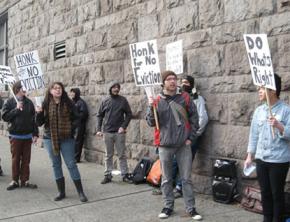Welcome home Alicia
reports on Portland activists' re-occupation of a foreclosed home.
IN A beautifully executed community reclamation, Alicia Jackson was moved back into her home on May Day in Portland, Ore.
A multiracial crowd of 500 gathered at Woodlawn Park in Inner Northeast, the center of the city's historically Black neighborhood, which has been gentrified and foreclosed upon with increasing intensity in recent years. Occupy Northeast, the Black Working Group (BWG), has set its sights on halting and reversing that displacement. This re-occupation was the first in what they vow will be many more.
Ahjamu Umi, a leader of the group, said:
It ain't Africa. It ain't even 40 acres and a mile, but it's the first person we helped reclaim their house. Black people owe active struggle to everything we have achieved and everything we have. No matter how people try to spin it today, our progress has never started or ended by attempting to buy and/or vote our way to freedom from the people enslaving us. It's all about our active struggle for independence and self-reliance.
Umi began the gathering with a traditional African libation and a calling out of the ancestors. Poetry and music filled the air, as children played with balloons and lawn signs were planted, calling on residents to "Support Your Neighbors, Stay in Your Home!"

The signs were the work of We Are Oregon (WAO), a community organizing arm of the Service Employees International Union. WAO spokesperson Angus Giesa explained how the group had prepared the neighborhood for Jackson's re-occupation.
For weeks, canvass teams from WAO and the BWG had scoured the blocks surrounding Alicia Jackson's home, holding meetings, getting signatures on a petition to halt all foreclosures, and securing lawn-sign locations.
As the crowd took to the street, police tried to box it in. An Occupy Portland contingent of masked and hooded marchers broke off in a diversionary move, which drew the attention of Portland's finest.
Because May Day also included a student march a few miles to the south, plus an "unfriendly tactics" march downtown, the cops were stretched thin, as anticipated by the reoccupation planners. The family-friendly march then turned down a quiet side street and occupied the block in front of Alicia Jackson's home, without police interference.
IN AN emotionally charged ceremony, Jackson cut a ribbon on her front porch and opened the door as the crowd posted "Welcome Home Alicia" and "Occupy Our Homes" signs on the house.
Quickly, with energy and precision, members of the Portland Liberation Organizing Council, an off-shoot of Occupy Portland, cleaned up the house, moved in Jackson's furniture and completely landscaped her yard, planting fruit trees, vegetables and flowers.
As children and child-like adults played dodge ball in the street and danced to "old school" tunes, a community speak-out commenced from the front porch. Ministers, poets, singers, homeowners facing foreclosure and political leaders took to the mike.
A community meal was served. The for-sale sign was transformed into a maypole, which became the dramatic center of a healing ceremony, weaving black and red ribbon, Black and white people, young and old together, to reclaim what had been stolen.
Hundreds signed up that day for an emergency-response, text-message network, ready to return on a moment's notice when the police come to try to evict Alicia Jackson. The Occupy Northeast Black Working Group has a round-the-clock presence at the house and has moved its organizing center to Jackson's living room. Already the phone is ringing off the hook with foreclosure victims seeking and offering solidarity.
The loss of family wealth in America's Black communities, wealth tied to equity in homes, is being stripped away at a phenomenal rate. Black and Latino families have lost over 60 percent of their wealth in the housing crisis, compared to 16 percent for white families.
According to the Center for Responsible Lending, 53 percent of African Americans who bought homes in 2006 have already lost or will lose their homes to foreclosure in the next few years.
The racist, predatory lending--which included a lot of variable rate, interest-only and balloon payment refinancing to accomplish needed repairs, combined with the housing bubble and crash--left many underwater (that is owing more on their home than its market value) with huge mortgage payments, unable to sell the homes.
Then the employment crash, which hit Black and brown folks the hardest as the last hired, first fired; and the racial discrimination in re-hiring; plus the impact of the war on drugs, which created a whole layer of economically disenfranchised Black men--all of these factors have led to a foreclosure epidemic in these communities.
Individuals like Alicia Jackson are beginning to break through the isolation, shame and embarrassment that comes with foreclosure. With the help of organizations like the Black Working Group, they are willing to step up to tell their story, to reveal how they had been lied to, hoodwinked and defrauded by Wells Fargo, Bank of America, Citibank, Chase and the various sharks who prey on victims of the housing and employment crisis.
And with the strength of this group and other groups, they will stay in their homes or at least put up a valiant fight, swelling the ranks of the foreclosure resistance movement.


